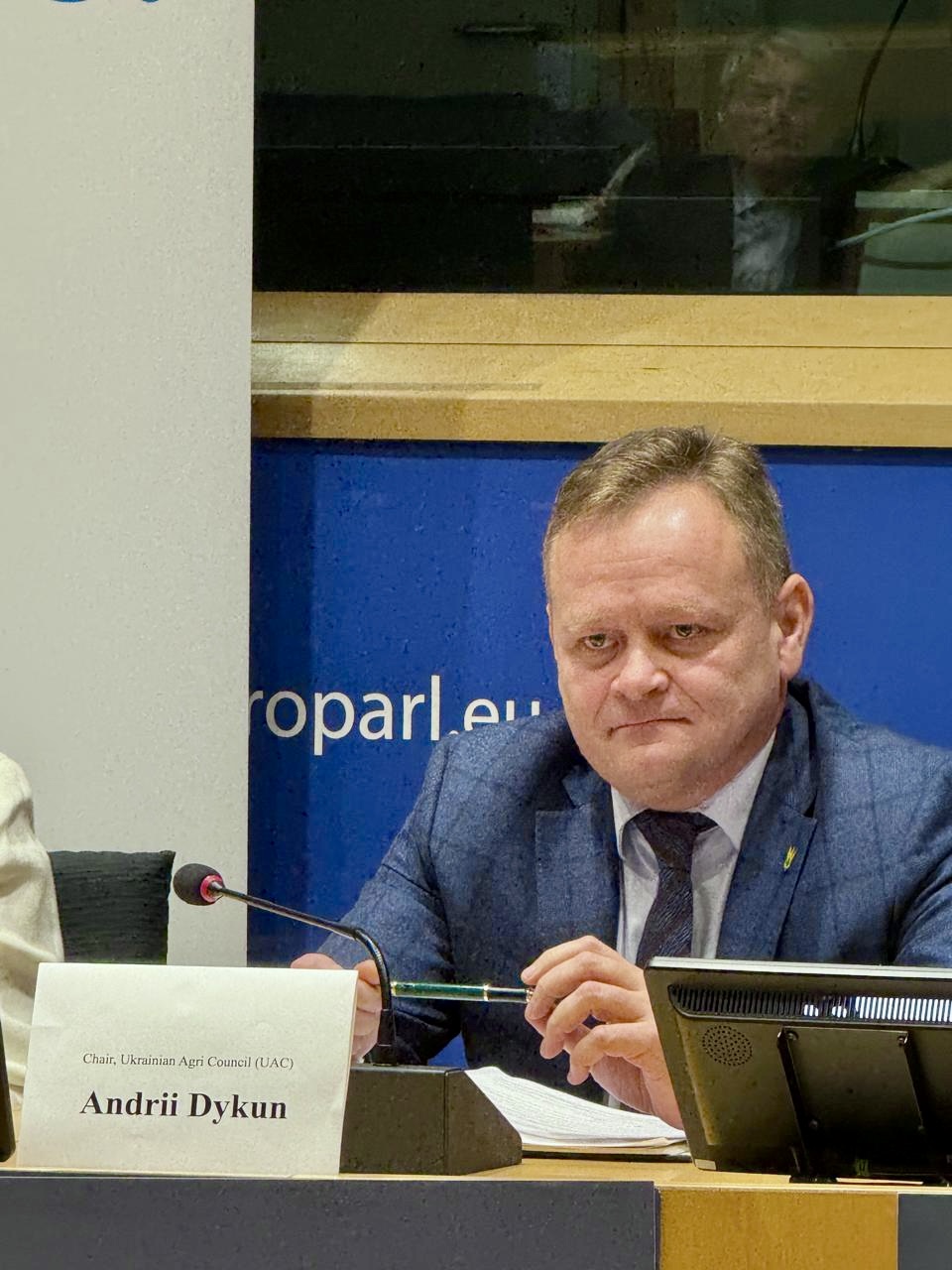On November 11, a public event titled “Integration of Ukrainian and EU Agriculture: Challenges and the Way Forward” took place in the European Parliament in Brussels. It was organized by the Renew Europe political group at the initiative of the Ukrainian Agri Council (UAC). The event brought together policymakers, agricultural representatives, and experts from Ukraine and the European Union to discuss future cooperation within the framework of the Common Agricultural Policy (CAP).

The Chairman of the UAC, Andrii Dykun, emphasized that now is the right moment for a strategic dialogue on how Ukraine can contribute to the development of the EU without creating challenges for the Common Agricultural Policy — especially as debates continue in Brussels about the CAP’s future and unjustified fears emerge concerning Ukraine’s potential EU accession.
“Ukraine’s European integration can strengthen both Ukrainian and European agriculture. We are already a global leader in sunflower oil exports, third in barley, fourth in corn, and fifth in wheat exports. Integrating this capacity into the European family can enhance food security, open new markets, and reinforce Europe’s position in the world,” — said Andrii Dykun.

He stressed that Ukrainian farmers do not aim to replace their European counterparts on the internal market but to join forces for joint competition on global markets, particularly in Africa and Asia, where Russia is aggressively expanding its agricultural influence and where food demand is growing fastest.
“By combining Ukraine’s production capacity with the EU’s quality standards and trade diplomacy, we can strengthen Europe’s presence and offer developing countries a reliable and sustainable alternative to Russian grain. However, to achieve this, Ukrainian farmers need a realistic regulatory framework that allows production for export to third countries under differentiated environmental standards — while fully complying with EU norms — and a 20-year transition period with safeguards that protect both sides and maintain food market stability,” — added the UAC Chairman.
Participants agreed that granting Ukraine the full level of CAP support immediately after accession would be a challenge for the EU, but this should be seen not as an obstacle, but as an opportunity to create a more flexible and smart model of integration.

“Too rapid an implementation of certain EU rules, especially those related to plant protection products, could lead to annual losses exceeding USD 2 billion — due to reduced yields and higher input costs. According to UAC estimates, this poses a real threat to the competitiveness of our farmers. Many substances still permitted in Ukraine are banned in the EU but continue to be used in Asian and African markets, where Ukraine directly competes with Russia. That is why we need a phased approach — similar to the one taken by Spain, Poland, and Romania — with gradual adaptation to EU standards, priority support for small and medium-sized farmers, technical assistance for harmonization, and mutual learning between Ukrainian and European producers. This will make integration manageable, balanced, and beneficial for both sides,” — said Taras Vysotskyi, Deputy Minister of Economy, Environment, and Agriculture of Ukraine.
Taras Kachka, Deputy Prime Minister for European and Euro-Atlantic Integration of Ukraine, emphasized that Ukraine’s agricultural sector includes diverse participants — large and small, more and less efficient, more and less vulnerable — and that achieving mutual understanding requires broad and inclusive dialogue.
“In my view, only as a result of such broad discussions — here in Brussels, in Ukraine, directly in the fields and at exhibitions such as in Hanover — can we overcome fears and concerns about one another and gain the courage to jointly develop the best food system in the world,” — summarized Taras Kachka.
The Ukrainian Agri Council expressed gratitude to the participants, including:
Bruno Memme, Director of commodities (Copa-Cogeca); Vincent Cordonnier, Unit Neighbourhood, enlargement and pre-accession assistance (DG AGRI); Tassos Haniotis, Senior Research Fellow at the International Institute for Applied Systems Analysis (IIASA); Dacian Ciolos, former EU Commissioner and representing Farm Europe; Pekka Toveri, Chair of the Delegation to the EU-Ukraine Parliamentary Association Committee (D-UA); Peter Polajnar, Deputy Head of Unit Ukraine Service: Economic and Sectoral Policies (DG ENEST); Taras Kachka, Deputy Prime Minister for European and Euro-Atlantic Integration of Ukraine; Taras Vysotskyi, Deputy Minister of Economy, Environment, and Agriculture of Ukraine; and Vadym Halaichuk, First Deputy Chair of the Verkhovna Rada Committee on Ukraine’s Integration into the European Union.
Special thanks to the Renew Europe Group, and in particular to Members of the European Parliament Valérie Hayer and Elsi Katainen, for supporting the initiative of Ukrainian agricultural producers and enabling a constructive dialogue aimed at developing a CAP approach tailored for Ukraine — inclusive, balanced, and strengthening the European Union as a whole.
Wednesday, 12 November 2025